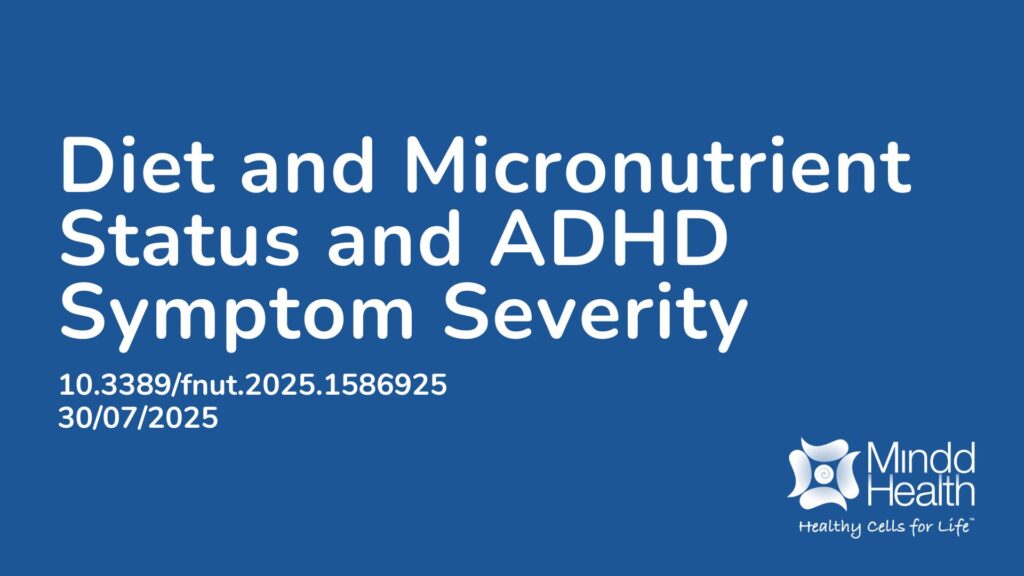Summary:
Nutrition is increasingly recognised as an important factor in conditions such as ADHD and autism. Research has shifted to understanding how multiple nutrients interact to influence brain function, including omega-3 fatty acids, B vitamins, vitamin D, zinc, magnesium, iron and iodine, for normal structure and activity. Low levels of these nutrients have been linked to cognitive and behavioural difficulties, and supplementation trials suggest potential benefits for ADHD symptoms. Research also highlights the role of omega-3 fatty acids in neuronal function, DNA methylation and neurotransmitter pathways, with deficiencies associated with higher rates of neurodevelopmental disorders. Altered gut microbiota and food sensitivities are increasingly observed in ADHD and autism, suggesting that diet and digestive health may further contribute to symptoms. This study examined nutritional profiles in a sample of 57 children and adults with ADHD, autism and related conditions. Blood tests revealed widespread deficiencies in omega-3 fatty acids, vitamin D, zinc and B vitamins. Lower magnesium and omega-3 levels were significantly associated with more severe ADHD symptoms in children. High rates of food intolerance were also reported, with more than 80% showing reactivity to dairy proteins such as casein, and over half reacting to wheat or gluten. These preliminary findings suggest that nutrient insufficiencies and food intolerances may play a role in the severity of ADHD symptoms. While the results require replication in larger controlled studies, they add to growing evidence that nutrition and diet are important factors in neurodevelopmental health.
Abstract:
Introduction: The role of nutrition in Attention-Deficit, Hyperactivity Disorder (ADHD) and other neurodivergent conditions is of growing public and research interest. There is little research reporting vitamin, mineral and omega-3 fatty acid levels in ADHD and brain health. Methods: This study presents nutritional and psychological data from a community UK sample of children (n = 47, Mean age: 10.1 years) and adults (n = 10, Mean age: 29.8 years) with ADHD, autism, dyslexia and other neurodivergent conditions (total n = 57). The participants undertook a blood draw which measured a range of vitamins, minerals and omega-3 fatty acids as well as food allergies and food intolerances which were then correlated with psychological symptom scores measuring ADHD symptoms. Results: The key findings, revealed that both children and adults presented with a range of insufficiencies in key nutrients which facilitate neurotransmitter function and, which are deemed as brain-essential, namely omega-3 fatty acids, zinc, B-vitamins and vitamin D. Furthermore, significant relationships were observed between nutrient levels and ADHD symptom severity in the children’s group. For example, red blood cell magnesium was negatively correlated with the Conners CI-Parent Rating Scale (CPRS) Disruptive Behavior scores (rho = −0.597, p = 0.024). The omega-3 index (sum of EPA + DHA as a percentage of total fatty acids) was negatively correlated with their Learning and Language Disorder scores, (rho = −0.601, p = 0.018). Magnesium levels were also associated with overall ADHD symptom severity (rho = −0.612, p = 0.02), implying that the greater the severity of ADHD symptoms, the lower the magnesium. This clinical cohort also presented with a range of food intolerances with over 80% of participants presenting with high reactivity scores to cow’s milk, other dairy, and casein, and just over half the sample intolerant to wheat and wheat gluten. Discussion: This is a novel study which presents preliminary data and insights in the role of nutrition in ADHD and neurodivergence. and relationships between nutritional insufficiencies and ADHD-symptoms. It specifically demonstrates a range of food intolerances and relationships between nutritional insufficiencies and ADHD-symptoms, which warrant further exploration in larger case-control groups.
Article Publication Date: 30/07/2025
DOI: 10.3389/fnut.2025.1586925



